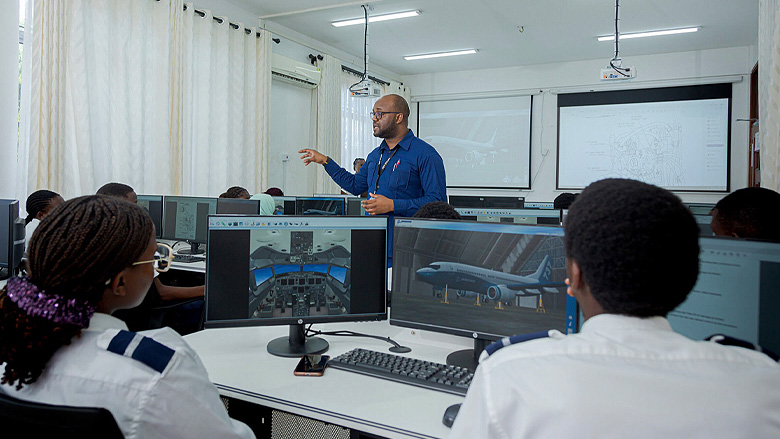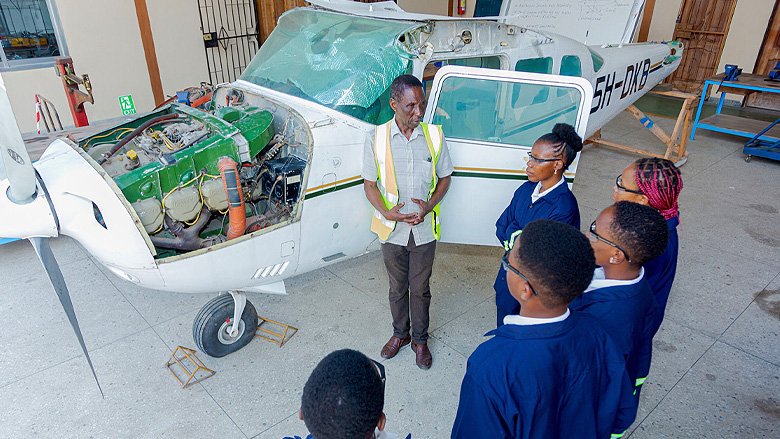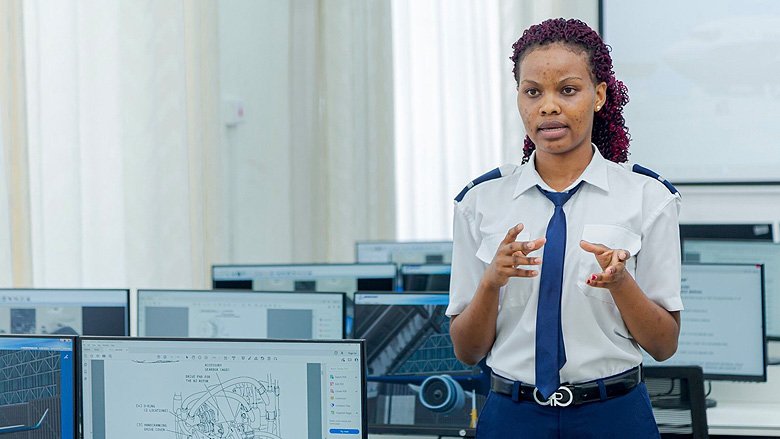STORY HIGHLIGHTS
- Tanzania’s National Institute of Transport is promoting the inclusion of women in studying math and sciences via gender sensitization, high-quality training, and scholarships.
- Through a college integration project, the institute has increased women’s enrollment in math and sciences since 2018/2019 to 34% from 22%.
- The Dar es Salaam-based institute is on its way to becoming a regional center of excellence in aviation and transport.
DAR ES SALAAM, Tanzania, September 6, 2023. Doreen Msafiri is living her father’s dream. In October 2022, she was enrolled at the National Institute of Transport (NIT) in Tanzania’s capital of Dar es Salaam, to pursue her Aircraft Maintenance Engineering Degree. Unlike Doreen, her father—though very passionate about aircraft engineering—had to opt for another career, because in his time such programs were not available in the country.
In Tanzania, NIT has been popularly dubbed “Chuo cha Madereva” (“College for Drivers”). This is because, despite being mandated to provide courses for all sectors of transportation, in the past, the college only focused on driving because it lacked the resources for other programs.
Luckily for Doreen, in 2016 NIT started offering Aircraft Maintenance Engineering, becoming the only college in Tanzania accredited to do so. Before this, the only option for students determined to pursue careers in this field was to study abroad, which was quite costly.
Through the World Bank-supported East Africa Skills for Transformation and Regional Integration Project (EASTRIP), NIT has now developed more than 20 demand-driven courses in various specializations, such as railways, the maritime sector, and aviation management and engineering at all levels. I feel privileged to study my preferred course, unlike my father for whom it remained a dream,” said Doreen. “The training we are receiving here is supported by solid modern facilities, ICT, and training equipment.”
The college facilities include equipment such as virtual maintenance trainers (VMT), typically used by leading aircraft manufacturers. The $600,000 facility contains a virtual reality simulation model in which students can practice aircraft maintenance using manuals and other safety procedures before they go on to gain experience on a real aircraft.
“NIT is the only college in Tanzania, and among the few colleges in Africa, to have a VMT facility,” said Abubakar Noor, the EASTRIP project coordinator at the college.
The project goal of EASTRIP is to increase access to and improve the quality of technical vocational education and training—TVET—programs in selected Regional Flagship TVET Institutes (RFTIs) and to support regional integration in East Africa. At NIT specifically, the project aims to establish a center of excellence in aviation and transport operations.
The idea of women in STEM takes off
According to a 2020 World Bank report, while girls outperform boys in school, and women are more likely to go to university than men, they are less likely to study Science, Technology, Engineering, and Math (STEM) and enter STEM careers. This is because young women and girls are disproportionately discouraged from studying STEM subjects or pursuing careers in these fields as adults. Globally, only 7% of women choose to study engineering, manufacturing, and construction, compared to 22% of men.
“As girls, our challenge is the perception that engineering is a man’s world, which is not the case,” said Gloria Chalamila, who is also pursuing a diploma in Aircraft Maintenance Engineering. “In our class, for instance, many girls are doing better than boys, and we have to inspire and motivate others, so they don’t succumb to societal perceptions about girls’ and boys’ careers.”
To encourage the participation of women in the transportation sector, NIT—through EASTRIP—has established a scholarship program targeting promising female students seeking transport-oriented programs. The college is engaged in outreach to secondary schools.
To Khadija Mohamed, who teaches electronics and telecommunications engineering at NIT, these efforts are helping increase girls’ STEM participation, although she argues sensitization is a continuing need. “Back when I was a student, in our class of 100 only eight of us were female, and all of us graduated,” said Mohamed. “But in several of the classes I teach today, I see the ratio between male and female students is almost the same.”

The female students at NIT currently represent 34% of the college’s total enrollment of 14,545 students, an increase from 22% in the 2018/2019 academic year.
Regional integration gets off the ground
To achieve its regional integration goal and support the development of regional public goods, EASTRIP is facilitating staff and students with exchange programs across the RFTIs in East Africa. Joint qualification frameworks are also being developed to help form a unified qualifications framework.
Mohamed herself recently attended Dire Dawa College in Ethiopia as part of an exchange program from which she says she learned a great deal on the robustness of occupational standards and how the college’s curriculum was customized to meet the needs of the labor market.
“Incidentally, upon my return, NIT was also in the process of preparing a new curriculum focused on quality, relevant, market-driven curricula, and I was able to effectively contribute to this process based on my experience,” said Mohamed. NIT is supporting staff capacity enhancement by sending its lecturers on training courses in different countries as well. So far, 11 lecturers are pursuing postgraduate programs.
Enrollment in NIT’s aviation and transport programs has skyrocketed from 400 in 2018 to over 8,000 today. It expects to have new facilities in place to support the growth of its aviation studies by 2024. These exciting new structures will consist of five cutting-edge buildings, including a center of excellence, a high-tech workshop, and a cabin mock-up complex complete with a swimming pool for training cabin crews in safety drills. Two hostels will be constructed with the capacity to accommodate 756 students. buildings
The college recently became the first and only college in Tanzania to obtain the certification needed by the International Air Transport Association to offer a cabin crew qualification course. “This is thanks to the quality of our trainers and facilities, such as cabin crew emergency evacuation trainers, firefighting trainers, and door trainers, with which we are able to do cabin crew mockups and teach cabin crew trainees to provide services and help people during emergencies,” said Noor, its EASTRIP project coordinator.


